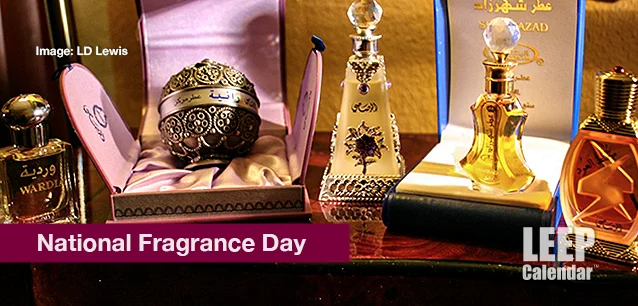 AD
AD
Today is: November 12
Scroll to explore events active on this date.
LEEP INK FEATURES

August? Absolutely!
In August, we live through the Dog Days of Summer. It's hot and often humid, and those who can leave for better climates do. Down south, winter is in full force. August is also known as "the ...

In The Heat of July: July 2025 Events
Is it hot enough (or cold enough if you're below the equator) for you yet? There is actually a day for that! Like every month, I pick a diverse collection of events you may or may not know about. This ...

May Blooms: Events in May 2025
Along with October, May is one of the most densely packed months of the year. It's before the summer humidity and the last whole month of the school year. The weather is warming in t...
About Fragrance Day
United Kingdom & Ireland , United States
Ends: Mar 21, 2023
DESCRIPTION:
The English word "perfume" comes from the Latin term "per fumus," meaning "through the smoke." The name may have something to do with incense, burning dried matter to scent the air, which was and is a part of many religious rituals.
Perfume has existed since around 2000 BC, receiving attribution in the book of Exodus in The Bible. Cleopatra, a queen of Egypt, was reported to bathe in aromatic oils. Deodorant and antiperspirants would not exist until the eighth century AD; perfumes often masqued unpleasant smells, chased away evil spirits, or were dabbed on to attract a mate.
The first perfume factory is believed to have existed in Cyprus approximately 4000 years ago.
During the golden age of Islam (800-1200s AD), perfuming oneself with oud (scented oils) was elevated. The Qur'an instructs men of the Islamic faith to fully bathe each Friday and apply scent if available. When the Qur'an was written in the seventh century, bathing regularly was a luxury for most people. With this instruction, scenting spaces and people became an art.
Queen Elizabeth of Hungary, in 1370 AD, had the first modern perfume created by combining alcohol, oils, and fragrance for personal use. The Christian world would need to wait until the Renaissance to discover the potential of the fragrance world. It would arrive through Arabic traders and become an industry through Catherine de Medici in the 16th century.
France became the center of scents in the 17th century. A luxury, typically only the wealthy and nobility could afford to purchase perfumes. Americans would create a less expensive version in the 19th century, mixing scents in water and calling it Cologne. Eu de Parfum and Eu de Toilette are additional iterations, with toilette being the lowest quality and concentration of the actual scent. The addition of water makes the scent affordable.
National Fragrance Day is observed in the United Kingdom (sponsored there by the Fragrance Foundation) and in the United States (no sponsor). It falls on the most fragrant day of the year, the first day of spring.
VIDEOS
Currently, this event does not have supporting videos.
SUPPORTING DOCUMENTS
Currently, this event does not have supporting documents.
ADDITIONAL IMAGES
Currently, this event does not have supporting images.
Where would you like to go now?
 AD
AD


/footer-logo.svg)
